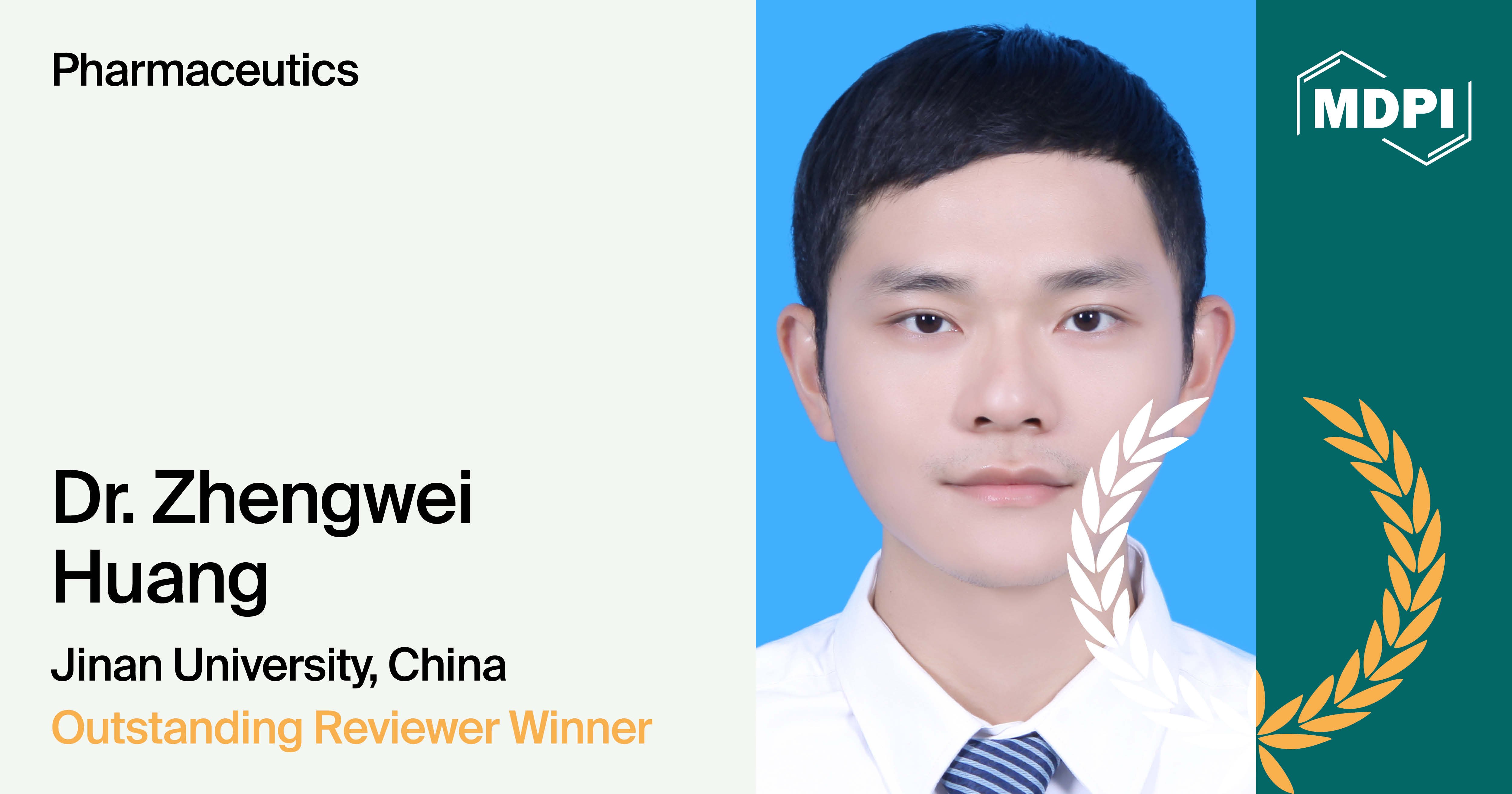
Journal Menu
► ▼ Journal Menu-
- Pharmaceutics Home
- Aims & Scope
- Editorial Board
- Reviewer Board
- Topical Advisory Panel
- Instructions for Authors
- Special Issues
- Topics
- Sections & Collections
- Article Processing Charge
- Indexing & Archiving
- Editor’s Choice Articles
- Most Cited & Viewed
- Journal Statistics
- Journal History
- Journal Awards
- Society Collaborations
- Conferences
- Editorial Office
Journal Browser
► ▼ Journal BrowserNeed Help?
Announcements
9 July 2025
Interview with Dr. Zhengwei Huang—Winner of the Pharmaceutics Outstanding Reviewer Award

We are pleased to announce the winners of the Pharmaceutics Outstanding Reviewer Award—Dr. Dinesh Nyavanandi, Dr. Zhengwei Huang, and Dr. Mladena Lalić-Popović.
Name: Dr. Zhengwei Huang
Affiliation: College of Pharmacy, Jinan University, China
Research interests: inhalable nanomedicines; Drug delivery; ferroptosis; protein corona; biological fate
Below is a short interview with one of the winners—Dr. Zhengwei Huang:
1. Could you introduce yourself to our readers? What is your current research area?
I am Zhengwei Huang, an Associate Professor at Jinan University, China. The university is located in Guangzhou, China. I obtained my doctoral degree from the School of Pharmaceutical Sciences, Sun Yat-sen University, in 2020, with Prof. Chuanbin Wu (Fellow of the Royal Society of Chemistry) as my supervisor. Based on my year of graduation, it is clear that I am an early-career researcher. I have published over 50 papers in the field of drug delivery and nanomedicines and have an H-index of 21. I have also applied for eight Chinese patents, with five being issued. My current research areas include pulmonary drug delivery, anticancer nanoparticles, ferroptosis, and protein corona.
2. Which research topics do you think will be of particular interest to the research community in the coming years?
Currently, there are many studies on anticancer nanoparticles, a field in which I work. For example, there are liposomal, micellar, and inorganic nanoparticles, the aim of which is to treat various cancers like lung cancers, breast cancers, and gliomas. These studies are important to some degree. I believe, however, that nanomedicines for non-tumor diseases, such as diabetes, lung fibrosis, and Alzheimer’s disease, will be prioritized in the near future. I am eager to see more papers on these topics and am, in fact, witnessing an increasing number of such publications at the moment.
3. What factors motivate you to be a reviewer for Pharmaceutics?
Pharmaceutics is a flagship journal in its field, and I enjoy reading papers in it. It is worth noticing that it is a fully open access journal, which facilitates global and free communication of knowledge on drug delivery. From this perspective, it is a pleasant experience to work with such a journal. Thus, I am proud to take part in the reviewing process for this journal. Also, it is a great honor to be awarded a reviewer certificate from MDPI journals.
4. Could you please share with us your experience as a reviewer for Pharmaceutics?
As a reviewer, you are typically requested to perform the review within a week’s time. This is okay for me, as I wish to participate in a rapid turnaround. It turns out that the editorial process is quite rapid, as is the author response process. The review experience is smooth. Sometimes you will receive suggestions to improve the quality of your review reports, which are very useful. In addition, it is my honor to receive this award as an outstanding reviewer.
5. What are the key factors and aspects that you consider most when reviewing a manuscript?
The novelty of the study design and the quality of the figures. As the field of drug delivery grows rapidly, novelty is emphasized. Personally, if the paper presents an impressive idea, even if it is just a preliminary work, it may catch the eyes of reviewers. In contrast, if a paper is just repeating some ordinary experiments, the priority for publication may decrease. As for the quality of visual items, there is a saying that a figure says more than a thousand words. The schematic illustration needs to be well-designed, and the data charts should be well-presented.
6. What are your opinions about the scientific publication market, and what do you think about the open access model?
Of course, the scientific publication market is necessary and important. MDPI is a successful service provider in this market. Of note, the open access model facilitates the communication of recent studies, but it is not without costs. Some authors from developing countries or regions, or even some authors from developed ones, can be deterred from open access publishing owing to financial stress. Thus, if there were more funding opportunities from various parties to help cover the APC, the development of the open access model would be further boosted.
Many thanks to MDPI, firstly. I would like to acknowledge Prof. Chuanbin Wu and Prof. Xin Pan, two senior scientists who are showing me the way in pharmaceutics research. Prof. Wu was my PhD supervisor, who showed me the way to develop my career. Prof. Pan is my senior colleague who inspired me a lot in my research topics. In addition, I would like to thank Dr. Wenhao Wang for his exciting experimental work.




